Type 2 diabetes remission? Ex-triathlete shares how; doctors urge better control of the disease
Over 400,000 people in Singapore have diabetes. Most of them do not manage their blood sugar levels well, which can lead to kidney failure or limb amputation. The programme Talking Point finds out the difference good diabetes control can make.
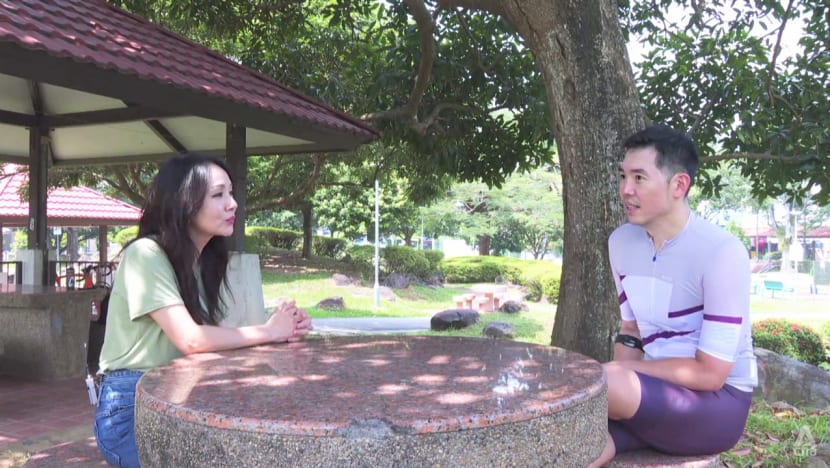
Talking Point host Diana Ser meets Brandem Liew to find out if there’s a fighting chance of beating diabetes.
This audio is AI-generated.
SINGAPORE: He was a triathlete for about two years. But when Brandem Liew started his own business, life got too busy, and taking care of his health fell by the wayside. Over five years, he piled on 15 to 16 kilogrammes.
Early last year, he began to get active again, cycling and running more. Then, while having blood tests done at a clinic earlier this year, Liew found out that he had diabetes, a week shy of his 41st birthday.
Diabetes is a disease in which the body does not respond to a hormone called insulin or is unable to produce it to control blood sugar levels. When there is an insulin shortage or when one’s body cannot effectively use what it produces, elevated blood sugar levels result and can severely damage the body.
“I felt that it shouldn’t be happening to me,” said Liew.
WATCH: Part 1 — Diabetes: I’m young and healthy. Why should I care? (21:39)
His doctor put him on medication to lower his blood glucose levels, and he worked on his diet with a nutritionist. After a month, there was promising news: Liew had a good chance of remission if he kept his efforts up.
He made the “big shift” from a “typical Asian diet” to something more customised. For instance, he switched all simple carbohydrates for complex ones, which include whole grains and brown rice.
“I had to be educated (on) the way I eat, and this involves food sequencing,” he told the programme Talking Point. “We line our stomach with fibre first — that means (eating) vegetables first, followed by protein.
“(Lastly), we take our carbohydrates, and this will help to reduce … the spike in blood sugar.”
Diabetes is on the rise worldwide. Singapore in particular has one of the fastest-growing rates of diabetes: More than 400,000 people here have the disease today, and the number could hit one million by 2050.
Quick facts about diabetes
About one in 12 Singapore residents aged 18 to 74 had diabetes during the period from 2021 to last year, according to the National Population Health Survey 2022.
There are two main types of diabetes. Type 1 is an autoimmune condition affecting the pancreas’s ability to produce insulin. Its exact cause is unknown.
Type 2 diabetes is the commonest form of diabetes. Most of its risk factors can be managed through lifestyle choices.
Prediabetes is a condition in which blood glucose levels are higher than normal but not high enough to be diagnosed as Type 2.
But there are ways to fight back against this silent killer.
SILENTLY DAMAGING BLOOD VESSELS
Diabetes is a “silent condition” as diabetics may not feel unwell, said Chia Kee Seng, professor and founding dean of the National University of Singapore’s Saw Swee Hock School of Public Health.
But in its silent phase, it continues to do damage. High blood sugar, a characteristic of diabetes, damages the kidneys’ blood vessels and tiny tubes called nephrons, which filter the blood, return needed substances to it and remove additional waste.
This can lead to long-term complications, said Chia. Kidney failure is one: Two in three cases in Singapore are due to diabetes. In fact, Singapore ranks first in the world for incidence of diabetes-induced kidney failure.
Even the young can be at risk. Kidney dialysis patient Lin Guo Qiang, for example, was diagnosed with Type 2 diabetes at age 14. He was prescribed oral medication but “didn’t really follow” his doctor’s instructions.
“Sometimes I forgot, sometimes I just missed (taking it),” said Lin, who continued gulping down soft drinks, for example drinking 1.5 litres of Coca-Cola at one go, “just for the thrill”, and eating fatty foods.
During his National Service, a food poisoning episode landed him in the emergency department. Doctors again told him his blood sugar levels were “quite high”, Lin, now 38, recalled. They prescribed oral medication and insulin, but he did not stick to the regimen because of financial difficulties.
“The medication was quite expensive back then, (inclusive of) insulin and the syringes. It was a bit hard for me to pay for all these things,” he said.
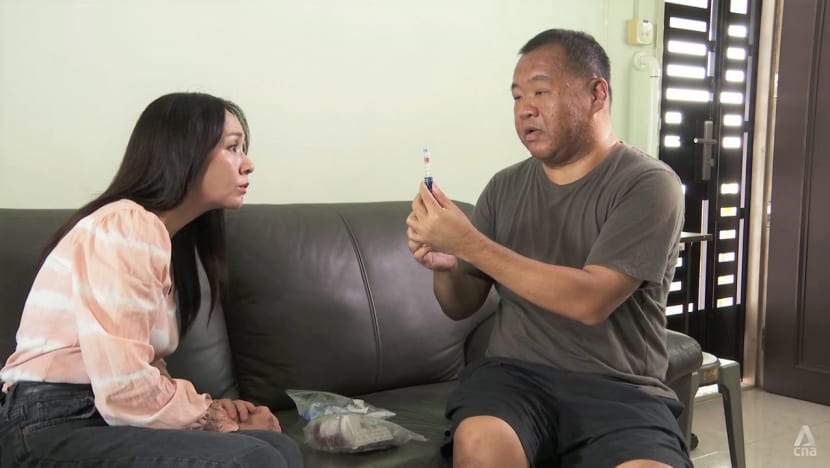
He continued with his high-sugar diet “because (he) was still very young and still quite strong”.
In his late 20s, his vision began failing. He went to see his diabetes doctor, who suspected he had “very early stage” kidney failure.
Besides the blood vessels in his eyes becoming damaged, what started as a “small pimple” on his left shin became “very red” and infected, with pus coming out. His leg swelled so much he could not put his shoe on. He also had a fever and vomited.
Today, he needs dialysis thrice a week and must inject himself with insulin as well as take six pills before each meal.
While his dialysis sessions do not incur out-of-pocket expenses — the money is deducted or claimed from his Medisave savings and MediShield Life plan — Lin stressed that he “can’t stop working”.
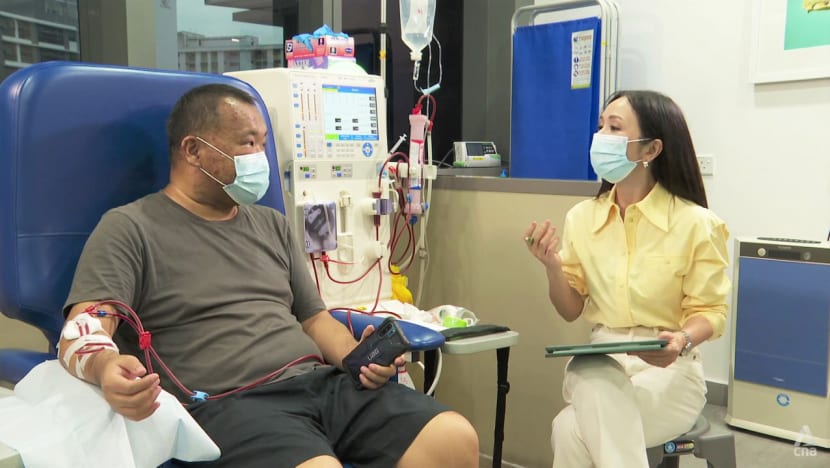
“If I were to lose my job right now, it’d be very hard to (keep funds flowing into) my Medisave (account) because there (would be) no source of income,” he said.
“And then it’d be hard for me to (get a job) as a dialysis patient. A lot of employers don’t like to hire those (with) chronic diseases.”
DIRECT AND INDIRECT COSTS
Another complication of diabetes is lower limb amputation. The reduced blood flow and nerve damage from poorly managed diabetes mean small wounds in the lower limbs cannot heal, and infections could set in and spread.
Singapore has one of the world’s highest diabetes-related lower limb amputation rates, at an average of four such amputations daily.
WATCH: Part 2 — Diabetes: How can I manage it, and what happens if I don’t? (21:58)
Diabetes exacts direct and indirect costs from society, said Kavita Venkataraman, an associate professor at the Saw Swee Hock School of Public Health. Medicine, dialysis and consultations are examples of direct costs, while indirect costs include time off work, early retirement and premature death.
The indirect cost of diabetes accounted for 58 per cent of the total cost of S$1 billion in 2010. By 2050, the total could balloon to S$2.5 billion.
Chia said that not only must patients be educated to comply with diabetes control, but also systems should be in place to “ensure that a large proportion of the diabetics are managed well”.
Diabetes self-management in Singapore has been ineffective. About six in 10 known diabetics aged 40 and above had poor control of their blood glucose level, the National Population Health Survey 2022 showed. The figure was almost eight in 10 for younger diabetics aged 30 to 39.
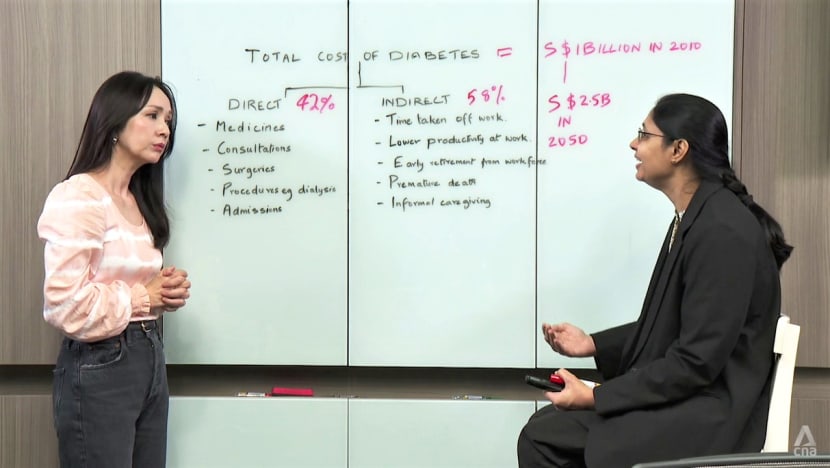
Business owner Liew belongs to the minority and has pushed himself to do even better. In addition to his eating habits, his lifestyle shift has included sleeping and waking early to get his workouts in.
From a blood sugar level of 10.8 per cent when he was diagnosed, he managed to achieve about 6.5 per cent within four months.
Diabetes is in remission when a patient’s blood sugar level returns to less than 6.5 per cent for at least three months after stopping medication.
The effort is worthwhile, Liew said. “When I achieve remission, I lower the risk of heart disease, I get away from possibly having dialysis. Living longer — I think it’s worth it.”
Watch Talking Point’s two-part special here and here. The programme airs on Channel 5 every Thursday at 9.30pm.
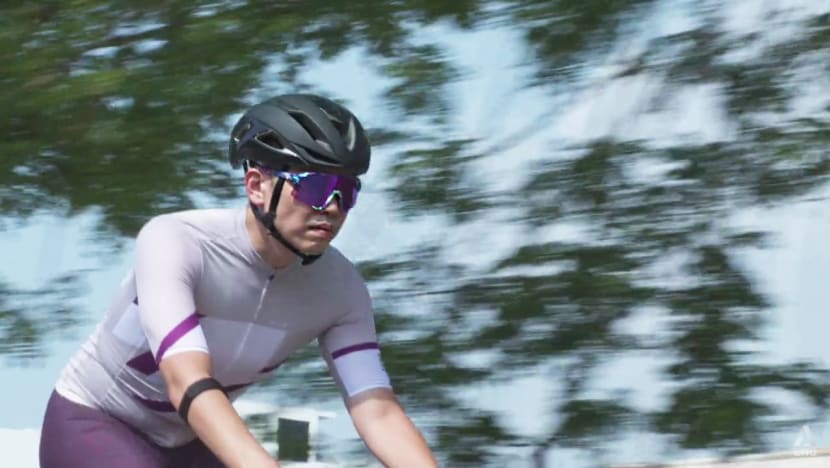





19c1.jpg)


